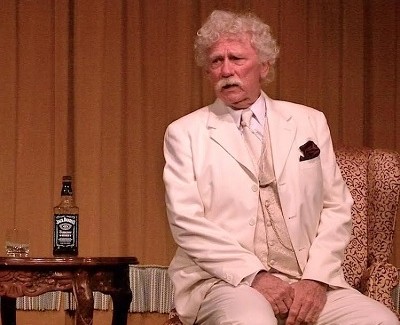American Queen presents Mark Twain
When Lewis Hankins dons his white suit to take the stage as Mark Twain, he has a long- time routine. Before greeting his audience, Hankins says a simple prayer.
“I say, ‘David, this is for you. Daddy has never forgotten you.’”
How Hankins came to be on stage as his favorite author seems to be an act of destiny. The retired Kentucky state policeman grew up reading Twain’s works. He delved deeply into the life of the man born as Samuel Langhorne Clemens, who chose the pen name Mark Twain to become known as the father of American Literature.
Before long, Hankin’s siblings – who were teachers – persuaded him to talk to their classes about the author. “Then I started dressing up as Mark Twain whenever I would be invited to talk about him,” he said. “One thing just led to another.”
Hankins became so immersed “that I sometimes think I know Samuel Clemens better than I know myself,” Hankins said with a smile. “We are kindred spirits.”
But it was a tragedy in his own life that made him feel even closer to the famed author. Hankins’ young son David was diagnosed with leukemia. “We tried to keep it from him that he was dying,” Hankins said. “How do you tell a child that he is dying?”
But one day, David brought up the subject himself. “He asked me if I would forget him if he died.”
Taken aback, Hankins didn’t know what to say. Then he answered his son’s question with one of his own. “I asked him if he would forget me if I died,” Hankins said.
When the boy answered that he would never forget his father – no matter what happened, Hankins replied that he felt exactly the same about his son. The oldest of Hankins three sons, eight-year-old David died in 1971.
Devastated beyond belief, Hankins found solace in Twain’s writings. In private life, Twain had suffered overwhelming sorrows – the loss of an only son in infancy, daughter Susy from spinal meningitis, daughter Jean drowned in her bathtub as a result of an epileptic seizure and the death of his wife – preyed upon his mind.
“He wrote that, “I know now what the soldier feels when a bullet crashes through his heart,’” Hankins said. “What impressed me was that he could use simple words to express his grief. His words captured my emotions exactly.”
Then fate moved Hankins even closer to the life of his hero. When Russ Varvel, vice president of the Delta Queen Steamboat Company, saw one of Hankin’s performances as Twain, he was so impressed that he offered Hankins a job as a performer with the Delta Queen company.
In January 1989, Hankins stepped aboard the riverboat in his three-piece Mark Twain white suit and spent the next 19 years entertaining and educating passengers.
Then the unthinkable happened. The three sister boats – the Delta Queen, the Mississippi Queen and the American Queen – were suddenly gone from the river.
“I missed it so much,” Hankins said. “When I heard that the American Queen was going to be back on the river, I wept. This is it. This is the last one. It represents a period of American history that once was and is so important.”
Since the American Queen started cruising again in April, Hankins has been booked for 33 cruises this year. In his one-man performance, Hankins steps on stage as the lights dim in the boat’s Grand Saloon for his “Marking Twain” program. Simple stage props include a lectern, wing back chair and table with a bottle of Jack Daniels.
At 75 years old with a mass of white hair framing his face and a wavy white moustache, Hankins looks strikingly like Twain. When he opens his mouth and speaks in the first person as Mark Twain, the result is riveting.
For almost an hour, Hankins fields questions from the audience, recites lines from Twain’s writings, brings loud laughs and ends his program with a song, “Sweet Low Sweet Chariot,” the same one Twain sang when his wife lay dying.
“I came in with Halley’s Comet in 1835,” Hankins solemnly recites Twain’s words. “It is coming again next year and I expect to go out with it. It will be the greatest disappointment of my life if I don’t go out with Halley’s Comet. The Almighty has said, no doubt: “Now here are these two unaccountable freaks: they came in together, they must go out together.’”
His prediction was accurate. Twain died of heart failure on April 21, 1910, one day after the comet’s closest approach to Earth.
“In 1910,” Hankins concludes, “I took man’s most valuable possession, which is his last breath.”
By Jackie Sheckler Finch
















View Recent Comments